Our professions
We present the professions for which we are educated at University of Nova Gorica and the areas of employment of the mentioned professions.
School of Environmental Sciences
Bachelor's programme Environment (1st level)
Qualification title: Diplomirani okoljski tehnolog (equivalent to Bachelor in environmental technology)
Programme description: Programme description and courses
Master’s study programme Environment (2nd level)
Qualification title: magister okoljskih ved (equivalent to Master of Science in Environment)
Programme description: Programme description and courses
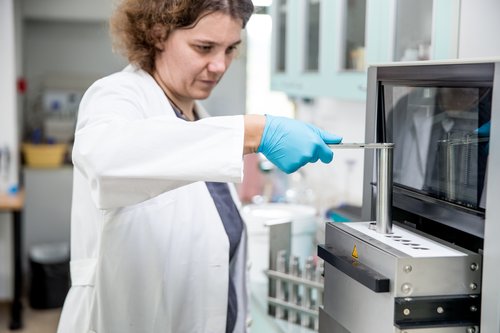
Our awareness of the importance of environmental issues is increasing, but we are also aware of the fact that environmental management calls for a professional approach. The School of Environmental Sciences was the first in Slovenia to have launched a comprehensive university study programme in the field of environmental sciences. The goal of our fully accredited first and second-level study programmes Environment is to educate professionals in the fields of environmental research and protection, as well as the management of the environment. The common characteristics of both study programmes is a strong focus on project work and practical field work, which are performed in cooperation with the business and the economy sector, as well as with the research units of the University, particularly the Laboratory for Environmental and Life Sciences.
School of Engineering and Management
Bachelor’s programme in Engineering and Management (First Level)
Qualification title: diplomirani gospodarski inženir (VS) (equivalent to Bachelor of Science in Engineering and Management)
Programme description: Programme description and courses
Master in Engineering and Management (Second Level)
Qualification title: magister gospodarski inženir (equivalent to Master of Science in Engineering and Management)
Programme description: Programme description and courses
Master in Leadership in Open Education (Second Level)
Qualification title: Master of Open Education
Programme description: Programme description and courses
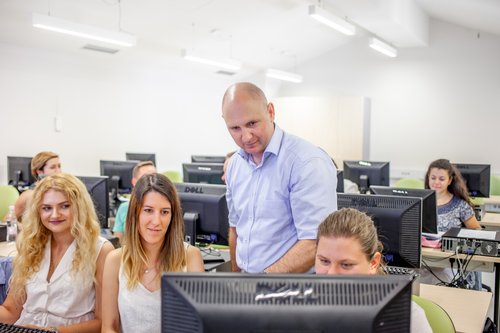
We are facing rapid changes in technologies and business processes. To identify these changes and put them into a successful practice, companies need broadly qualified professionals knowing the engineering, economic and organizational aspects of the business. With their comprehensive understanding, they know how to solve problems at the intersection of technology and entrepreneurship. We educate graduates with such a profile at study programs Engineering and Management, Bachelor's and Master's level.
The field of education must also follow rapid changes in professions and in society in general. Open education enables quick adaptations to these changes in schools and in the economy, supporting at the same time also sustainable development goals. The Master's program Leadership in Open Education is for future managers that will shape the development in this field.
In all our programs we give a lot of attention to the acquisition of practical knowledge, discussions and project work.
The graduates are qualified to work mainly in the following areas:
- management and administration of technological and business systems,
- management of production processes in industry,
- marketing of engineering services and industrial products,
- design, management and evaluation of investment projects,
- drawing up strategic and operational development plans,
- participation in the development of technological processes,
- control of computerized systems.
Graduates are mostly employed in the so-called middle management, where they work as production managers, maintenance managers, commercial managers, but also work as sales engineers.
School of Science
Physics and Astrophysics 1st cycle
Qualification title: diplomirani fizik /diplomirana fizičarka
Programme description: Programme description and courses
Physics and Astrophysics 2nd cycle
Qualification title: magistrica/magister fizike
Programme description: Programme description and courses
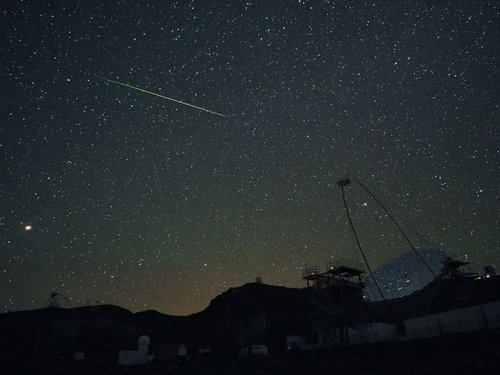
The School of Science is a hub of enthusiastic students, researchers, assistants and professors from Slovenia and all around the world. United by common passions, that range from atoms, molecules, materials, devices, to the understanding of our atmosphere, the stars, galaxies and the Universe as a whole. The School of Science offers research-oriented BSc, MSc degrees, supported by our labs and research centers. Furthermore, students have the unique possibility to remotely perform astronomical observations with a telescope located under the dark sky of Chile. At the UNG Graduate School, there is the possibility to continue to PhD degree in Astrophysics, Physics or Materials Science.
The first-cycle university program in Physics and Astrophysics is research-oriented from the very beginning.
In addition to student laboratories (Physical Laboratory I - V), which students encounter throughout their years of study, students are already involved in research work in six laboratories and centers that support pedagogical work in research.
The basic goal of the second-cycle master's study program "Physics and Astrophysics" is to educate experts in the field of astrophysics and solid state physics. Both orientations enable masters to continue their studies at the doctoral level as well as employment in a wide range of companies, institutions and government bodies in Slovenia and abroad, either due to specific expertise or the ability to use mathematical, computer and experimental tools, physical approach to problem solving and ability to work and communicate in an international environment.
Materials Sciences 2nd cycle
Qualification title: magistrica/magister fizike
Programme description: program in predmetnik
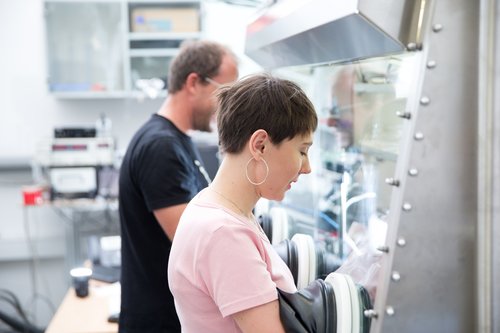
The second-cycle master's study program "Materials Science" is interdisciplinary and research-oriented. The program is designed in cooperation with the Institute of Chemistry and the Jožef Stefan Institute in accordance with good staffing and research conditions in the fields of physics and chemistry of materials, characterization of materials, materials technologies and development of innovative products and services, including intellectual property protection. According to the teaching contents, the sciences of inanimate nature represent 60% and the technical sciences 40% of the program. The study program provides a comprehensive overview of the understanding of mechanical, electrical, magnetic, optical and other properties of different types of materials and their design, synthesis, characterization, production and use. Laboratories and centers that implement programs that support them, so that the SUNGREEN OP7 RegPot project has been selected as the most regionally promising field of environmental science and new materials science, lecturers achieve a field related to materials research, research success worldwide .
It is intended for students who want to acquire top competences and knowledge in the field of knowledge and opportunities for the development of various new types of functional materials, with an emphasis on environmental and energy applications.
School of Humanities
Bachelor’s study programme Slovene Studies (1st level)
Qualification title: diplomirani slovenist (UN)/diplomirana slovenistka (UN)
Programme description: Programme description and courses
The graduate is able to understand and master the complex issues of Slovenian language and literature. He can perform work in the field of literary theoretical and literary-historical and linguistic research, proofreading of spoken and written messages, learning Slovene in primary and secondary schools (this job is possible after obtaining a qualification with an additional pedagogical module), learning Slovene as a foreign / second language, journalism and journalism creation, editorial work, in media houses, documentary work, library work, in the field of theater and animation in various fields of amateur culture and education of special groups of students (adults, young unemployed,…).
Master in Slovene Studies – Literary Science
Qualification title: Master's of Slovene Studies
Programme description: Programme description and courses
The basic goal is qualified professionals who have the most comprehensive insight into the literary sciences with a strong scientific approach to the literary sciences. They are capable of in-depth treatment of problems and a research approach to their solution, they know how to study concrete literary phenomena, and at the same time they have a basic insight into the possibility of transferring their own knowledge in practice. After completing their studies, they are capable of both the latest scientific work and work in a specific company and / or organization dealing with literary issues.
Master in Slovene Studies - Linguistics
Qualification title: Master's of Slovene Studies
Programme description: Programme description and courses
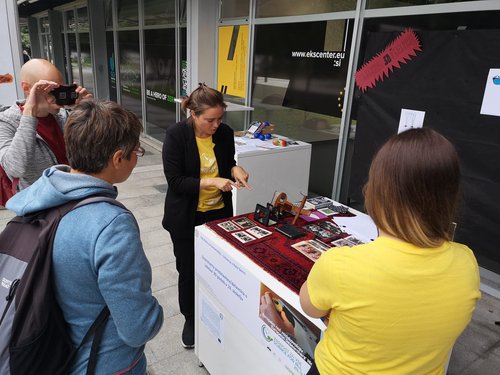
The basic goal of the study program Slovene Studies, majoring in linguistics, is to train professionals who have the most comprehensive insight into the linguistic sciences with an emphasized scientific approach to linguistics. They are capable of in-depth treatment of problems and a research approach to solving them. They master several areas of studying specific problems and have a basic insight into the possibility of transferring their own knowledge into practice. After completing their studies, they are capable of both their own scientific activities and activities in a specific high-tech company.
Digital Humanities
Qualification title: MA in Digital humanities
Programme description: Programme description and courses
The interdisciplinary program Digital Humanities is a master's study program II. Bologna degrees. On the one hand, its interdisciplinary concept is a continuation and specialization of 3-year study programs in the field of humanities. On the other hand, it is intended for graduates of computer science and informatics, directing students to work in the field of digital humanities at the master's level. Due to the diversity of enrolled graduates of 3-year programs, the study is designed as a methodological reflection and project-oriented, upgrades subject-specific competencies of undergraduate studies in the context of new information technologies and changes in society and culture. Horizontally, the study program is connected with master's studies in humanities and computer science / informatics (within elective courses).
Bachelor’s study programme Cultural history (1st level)
Qualification title: diplomirani zgodovinar (UN) / diplomirana zgodovinarka (UN)
Programme description: Programme description and courses
The aim of education is to form a graduate / master as a professionally comprehensive personality who is able to understand and master the complex issues of cultural history as an independent and unique phenomenon. We can expect the graduate to successfully study cultural-historical issues in relation to general and specific phenomena, which are especially pronounced at the crossroads of different cultural and national spaces. The graduate is able to establish comprehensive and creative relationships between experts from various scientific disciplines, who must necessarily participate in solving practical and research problems in the field of cultural history. He is also qualified for independent application work.
European Master in Migration and Intercultural Relations (Erasmus Mundus)
Qualification title: MA in Migration and Intercultural Relations
Programme description: Programme description and courses
The basic goal of the international study program Migration and Intercultural Relations is to train experts who, with the help of acquired theoretical, methodological and empirical knowledge with an emphasis on interdisciplinary approaches and transcultural aspects of migration, are ready to lead or independently implement research projects. In addition to gaining insight into practical work with migrants in an intercultural context, they are able to critically evaluate existing migration studies and current practices and strategies in the context of migration and integration policies. With the acquired expertise for planning, coordination and evaluation work in this field, they can sovereignly co-design and implement strategies for formal legal and practical regulation of intercultural relations related to migration.
School for Viticulture and Enology
Bachelor's programme in Viticulture and Enology
Qualification title: diplomiran inženir vinogradništva in vinarstva (VS) (equivalent to Bachelor of Science in Viticulture and Enology)
Programme description: Programme description and courses

After completing the program, graduates independently and holistically, with some practical experience, master the following areas of work:
- viticultural technologies,
- reed growing and vine selection,
- integrated and organic grape production,
- wine technologies,
- analytical methods in winemaking,
- wine marketing,
- record keeping.
Graduates have employment opportunities:
- on wine farms,
- in cooperatives or production wine cellars,
- in vines,
- in wine analysis laboratories,
- in agricultural advisory services,
- in professional pedagogical professions,
- in professions related to the sale and promotion of wine,
- in catering, units.
Master's programme in Viticulture and Enology
Qualification title: magister vinogradniških in vinarskih ved (equivalent to Master of Science in Viticulture and Enology)
Programme description: Programme description and courses
The 2nd level study program Viticulture and Enology is a two-year, interdisciplinary study program that enables the acquisition of knowledge for mastering and understanding modern and sustainable technologies of grape production and processing while understanding all involved agro-ecological, physiological, plant-pathological, chemical and microbiological processes, as well as applied technologies of modern plant and vine biotechnology. With elective courses, which are planned in both the 1st and 2nd year, students can specialize in the required compulsory knowledge in selected areas related to viticulture and winemaking, such as fertilization and soil fertility, climate change and their impact on viticulture and winemaking, plant ecophysiology, metabolomics, plant bioactive compounds, remote sensing in agriculture, agritourism or in the field of farm management.

School of Arts
Bachelor's programme in Digital Arts and Practices
Qualification title: diplomant digitalnih umetnosti in praks (VS) (equivalent to Bachelor of Arts in Digital Arts and Practices)
Programme description: Programme description and courses
Master's programme in Media Arts and Practices
Qualification title: magister medijskih umetnosti in praks (equivalent to Master of Arts in Media Arts and Practices)
Programme description: Programme description and courses
Graduates / masters can be employed in media (TV, Internet, electronic and print newspapers) and production houses, advertising agencies, architectural offices, galleries, museums, archives, etc., in short, where they are engaged in the production and post-production of video, film, Photos, graphical user interface, animations, animated film and animated graphics or anything used as secondary, presentation means. Some of the profiles belong to the deficit professions, e.g. a multimedia author and film animator, which means they are especially sought after in the job market.
Graduates with a more pronounced individual creative potential can, of course, test themselves as self-employed in culture, as authors in the field of contemporary art, authors of films and animated films, independent photography or authors of multimedia.
Graduate School
Environmental Sciences (Third Level)
Qualification title: Ph. D. (Doctor of Science)
Programme description: Programme description and courses
The environment is an area that requires a highly multidisciplinary approach and appropriately trained experts in the field of research, protection and environmental management. As a result of the lack of experts with appropriate multidisciplinary knowledge, the main difficulties in solving environmental problems include cooperation between experts with highly science-oriented knowledge on the one hand and managers, lawyers and related staff on the other. The basic purpose of the study is to educate top researchers with interdisciplinary knowledge.
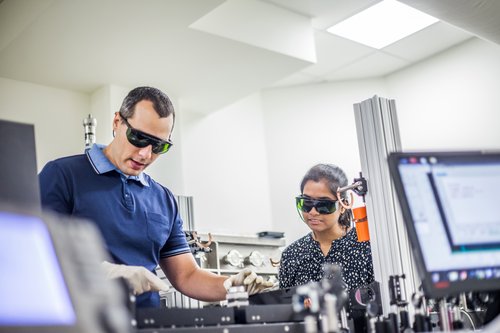
Physics (Third Level)
Qualification title: Ph. D. (Doctor of Science)
Programme description: Programme description and courses
Graduates of the doctoral study programme in Physics can be employed in research institutes and universities, where they will pursue an academic scientific career in the field of physical sciences. In industrial development departments, they can assume the highest management positions in the field of substantive issues of new technologies and products development and strategic orientations of the company.
Materials (Third Level)
Qualification title: Ph. D. (Doctor of Science)
Programme description: Programme description and courses
The doctoral study program Materials is focused on interdisciplinary, research and the needs of industrial development. It enables the acquisition of knowledge and skills for the design of various basic types of materials from their synthesis to the characterization and understanding of the relationship between the structure, properties of the material and its operation.
Cognitive Science of Language (Third Level)
Qualification title: Ph. D. (Doctor of Science)
Programme description: Programme description and courses
The programme provides students with education and training in the core areas of formal linguistic theory, syntax, semantics and phonology - all within the framework of generative grammar. In addition, the program offers a selection of subjects dealing with contemporary trends in phonology, syntax, semantics, pragmatics, psycho- and neurolinguistics, and computational linguistics.
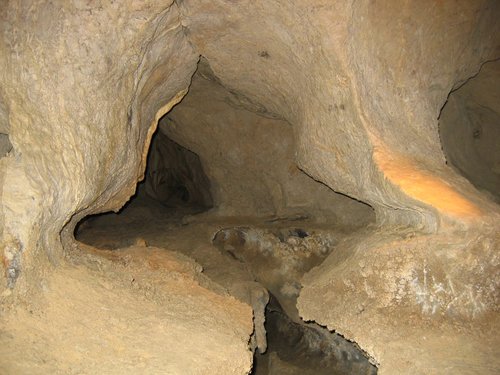
Karstology (Third Level)
Qualification title: Ph. D. (Doctor of Science)
Programme description: Programme description and courses
After completing the study, the acquired knowledge can be used in institutions that deal with karst research and in those that manage and administer it. The basic goal of the study is to educate two types of karstologists. The first is a karstologist researcher who is able to independently explore karst and karst phenomena from a variety of perspectives and for a variety of needs. The second is a karstologist user or manager who knows how to use all the knowledge about karst from specialized experts for a variety of useful purposes (economy, education, protection).
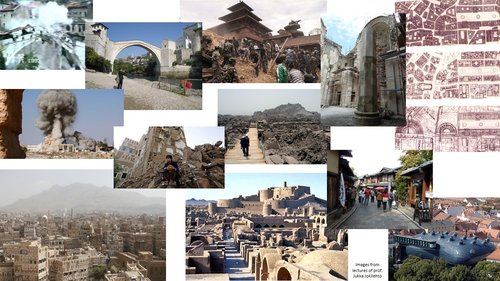
Cultural Heritage Studies (Third Level)
Qualification title: Ph. D. (Doctor of Science)
Programme description: Programme description and courses
The program is based on an interdisciplinary combination of construction-architectural and economic-legal knowledge, which structurally complement the theoretical aspects of conservation. The study is conducted within two specialist areas: techniques and materials, economics and management. The goal of the technique and materials is to educate professionals who are theoretically highly qualified in technical knowledge in the following areas: knowledge of structural characteristics and properties of historical materials and technologies, use of diagnostic procedures and choice of typologies of interventions and construction site organization. The goal of the economics and management orientation is to educate experts in the fields of economics of culture and art and cultural heritage management, for the development of sustainable policies in the field of protection and in the field of valorization of cultural heritage.
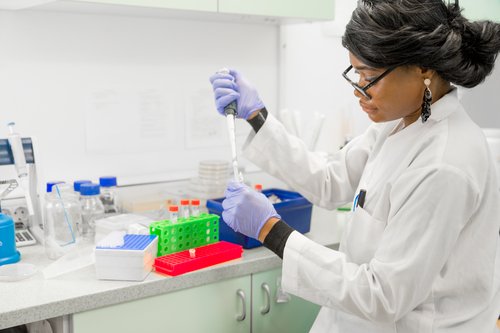
Molecular Genetics and Biotechnology graduate study programme (Third Level)
Qualification title: Ph. D. (Doctor of Science)
Programme description: Programme description and courses
The postgraduate programme provides future doctors of science with all the necessary knowledge to accurately understand the scientific approach in the field of biosciences, the development of independent thinking and critical assessment, and the development of personal responsibility and decision-making skills. The program provides quality education for young professionals who can use the acquired knowledge in various fields. As molecular biologists they can work in the healthcare, food industry and environmental protection, and as biotechnologists they can use their knowledge of new and advanced technologies in the field of industrial production of useful products.
Humanities (Third level)
Qualification title: Ph. D. (Doctor of Science)
Programme description: Programme description and courses
The doctoral study program in Humanities opens up three research areas: literary sciences (including digital humanities), migration and intercultural relations, and history. Among other things, it also supports research topics arising from the rich cultural heritage of our region (eg cross-border literature). You will work in an international environment, in small groups, with a customized schedule according to your other (work) responsibilities.
